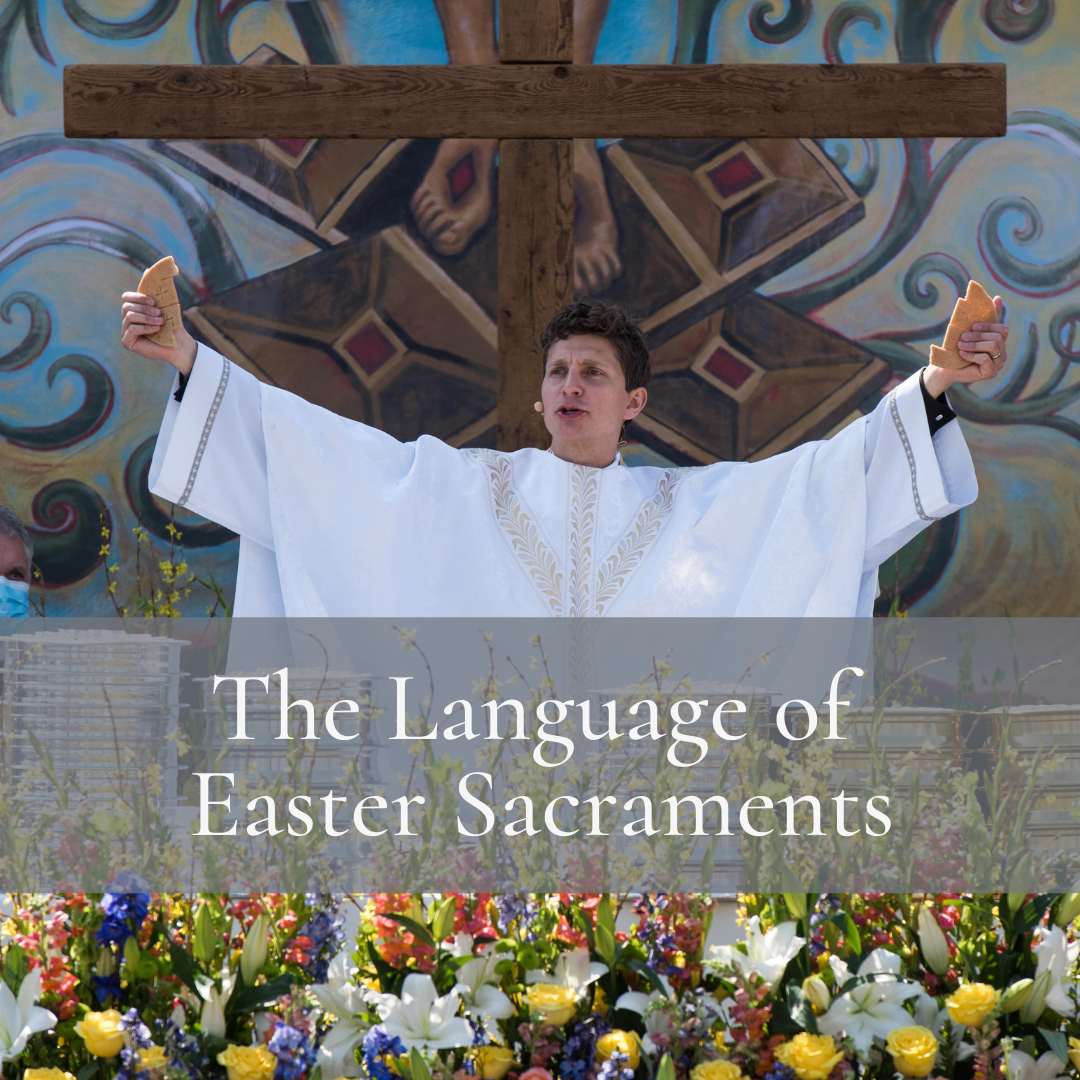When I heard God speak these words to me through his Word at age 16, my life was forever changed: “Therefore, there is now no condemnation for those who are in Christ Jesus” (Rom. 8:1).
Do you want to hear God speak? At Easter, you have an opportunity to hear at least two visible words from God: Baptism and the Eucharist. Understanding those words, just like understanding any words, requires that we understand the “grammar” of God’s language. When we learned our first language, we coordinated certain grammatical “signs” to meanings. The word “apple” refers to that red, yummy fruit that grows on a tree. The word “house” refers to that place you live. The word “wizard” refers to my wife Sophia on Sunday morning (okay…but am I wrong though?). But if you consider the letters a-p-p-l-e themselves, nothing about those letters squished together inherently means “the yummy, red fruit that grows on a tree.”
Other “signs” communicate through a connection that the sign has with its meaning. For example, Will Smith didn’t need to say anything after slapping Chris Rock across the face. The slap (“The Slap: Oscar Edition,” a new Netflix original series) itself communicates “I’m so angry I want to hurt you” by virtue of, well, causing hurt. On the other hand, fixing your eyes intently on a speaker communicates interest as a visible correlation to “attention.” Being present with a grieving friend communicates “I want to be near you and with you in your pain.” Like smoke signifying fire, these signs have an organic connection to what they convey.
Baptism and the Eucharist are signs in the latter category. Just as we had to learn what the sign “apple” meant or what our presence meant to a friend, we need to train our imaginations to hear what God will say to us in Baptism and the Eucharist on Easter morning. God sanctifies—sets apart—the gift of water to convey something. The waters of Baptism are God’s watery word in which he says, “You are clean and forgiven, you are my adopted child, and you will be raised through your risen Lord” (Rom. 6:1-6, Acts 2:38, Gal. 3:27-28).
Do you ever wonder if you’ve been really saved? Look to your Baptism; God objectively spoke a word of salvation to you. In your Baptism, God says “the eternal Son’s death buries your sin and his resurrection guarantees yours.” The newly Baptized will enter into the dawn wrought by the first Easter morning on this Easter. And in renewing your Baptismal vows, you will be invited to recall that word spoken over you at your own Baptism. There, God objectively told you that you belonged to him–and God never lies. Therefore, live as his.
Living into our Baptismal reality requires spiritual food. This is the role of the Eucharist. Every Sunday, when we take Eucharist, you have a chance to hear God speak just as viscerally as if he were to say an audible word to you. After all, he is speaking with bread-words and wine-words. It might seem odd to touch and taste the body of Christ broken for us on Easter morning, but it fits the shape of Scripture.
Jesus continually correlates the forgiveness of sins with physical healing. The healing of the paralytic’s broken body was the visible proof of forgiveness (Mark 2:1-12). Through the Eucharist, Jesus draws us into the atoning reality of his death on our behalf. Every Eucharist, God says through bread-words and wine-words: “through my Son’s death, you are forgiven.” That forgiveness carries in it the promise of the restoration of our bodies and the restoration of all of creation. Sin led to the curse (Gen. 3, Rom. 8) that wrought both spiritual and physical death for humanity, and a pervasive brokenness throughout creation. The forgiveness of sin is the breaking of that very power that wrought such brokenness. It is the precondition for the renewal of all things touched by the Fall. We remember his death on Easter because it was through death that our Lord dealt with death. By dying, our Lord satisfied the penalty of sin and canceled its power. His resurrection then is the first-fruits of an order liberated from all aspects of the curse. Forgiveness frees us for resurrection.

In May 2013, I was baptized into Christ Jesus. I’ll never forget what I heard in my heart while I was drying off with a towel: “You are mine. There’s no turning back now.” And I remember my 16-year-old self joyfully responding, “I’m yours. Thank you, thank you, thank you.” Finally, I tasted the kind of Fatherhood that I had craved throughout childhood. Finally, I found my heart ringing with the feeling of God’s embrace. In the depths of my longing for a father, God gave me himself in my Baptism. And every Eucharist, I taste his Fatherhood wrought in the eternal Son, and shared with me by the Spirit. So come, see, embrace the God who embraced you in Baptism, and taste the Eucharist and see that he is good!
Sean Luke is a seminary student at Trinity Evangelical Divinity School who has been attending Church of Resurrection since 2017. Shameless plug: You can follow his musings on Anglicanism and theology on his blog, Pursuing God’s Thoughts, or on his Youtube channel and podcast, Anglican Aesthetics.

